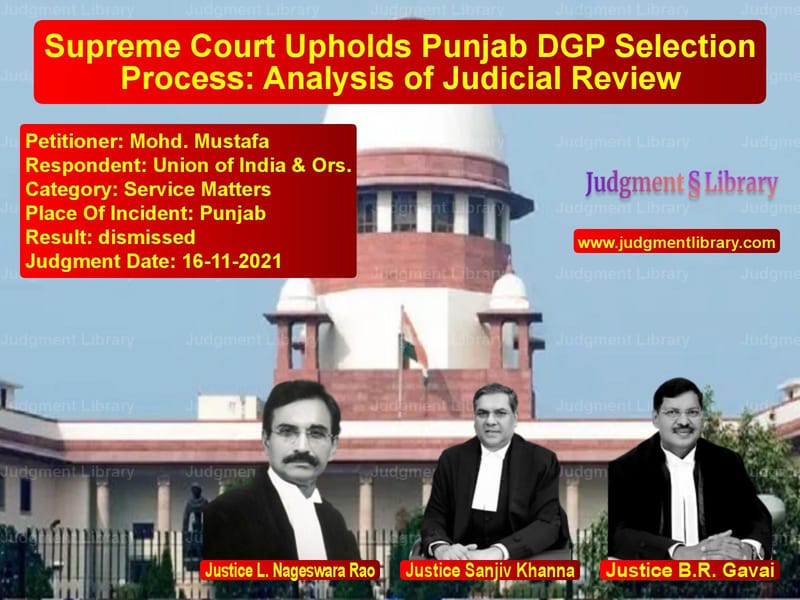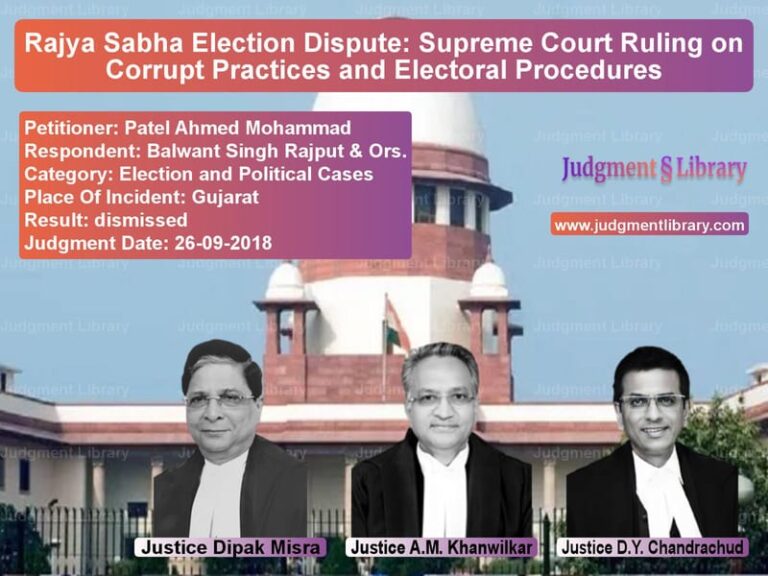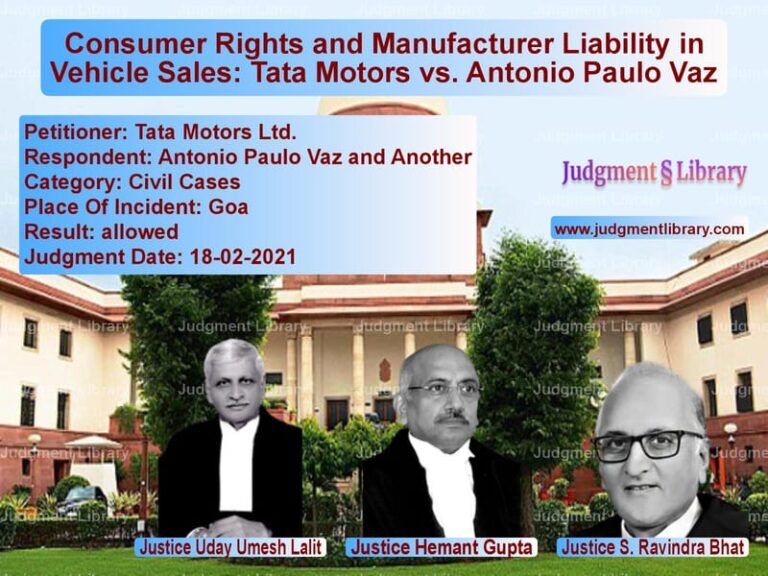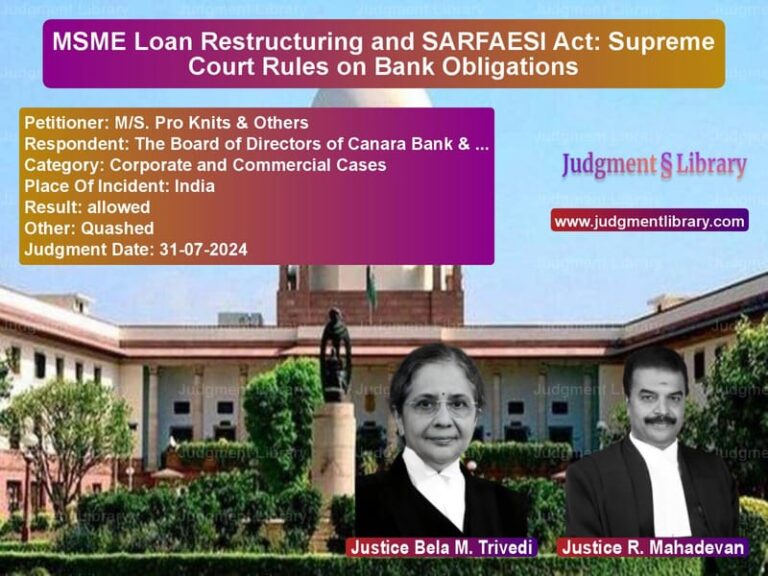Supreme Court Upholds Punjab DGP Selection Process: Analysis of Judicial Review
The appointment of the Director General of Police (DGP) in Punjab led to an intense legal battle that ultimately reached the Supreme Court of India. The case revolved around the selection of Mr. Dinkar Gupta as DGP (HoPF), with allegations of bias and procedural irregularities. The Supreme Court dismissed the appeals, upholding the selection process and emphasizing the principles of judicial review.
The dispute began when the Governor of Punjab appointed Mr. Dinkar Gupta as DGP (HoPF) on 07.02.2019. The appointment was challenged by the petitioners, Mohd. Mustafa and Siddharth Chattopadhyaya, before the Central Administrative Tribunal (CAT). The CAT found the selection process to be inconsistent with the guidelines laid down in Prakash Singh v. Union of India and directed the Union Public Service Commission (UPSC) and the Punjab government to conduct a fresh selection process.
Aggrieved by the Tribunal’s decision, UPSC, the Punjab government, and Mr. Dinkar Gupta approached the Punjab and Haryana High Court, which overturned the Tribunal’s ruling. Dissatisfied with the High Court’s judgment, the petitioners moved the Supreme Court.
Arguments by the Petitioners
The petitioners contended that the selection process was vitiated by bias and procedural irregularities. Their primary arguments included:
- Mr. Dinkar Gupta’s selection was influenced by bias since one of the empanelment committee members, Respondent No.5, allegedly held prejudices against the petitioner.
- The UPSC’s Draft Guidelines were inconsistent with the criteria established in Prakash Singh’s case.
- The selection of core policing areas for assessment was manipulated to favor Mr. Dinkar Gupta.
- Seniority, a crucial factor as per the Supreme Court’s ruling, was disregarded in the selection process.
- Mr. Mohd. Mustafa, one of the petitioners, had a distinguished service record with numerous gallantry awards, yet he was not considered in the final panel.
Arguments by the Respondents
The respondents, represented by senior legal counsels, defended the selection process with the following arguments:
- The Draft Guidelines had been approved by the Supreme Court in earlier proceedings and were in line with the ruling in Prakash Singh’s case.
- The selection of five core policing areas was done objectively, considering the specific security needs of Punjab.
- The empanelment committee was not required to record reasons for its decisions.
- The petitioners had not objected to the selection process at the appropriate time but only after the results did not favor them.
- The appointment process was conducted fairly, and the chosen officer met all required criteria.
Supreme Court’s Observations
The Supreme Court examined the legality of the selection process and reaffirmed the principles of judicial review. The Court emphasized that interference in expert committee decisions should be limited to cases involving bias, malafide intent, or violations of statutory provisions.
The Court dismissed the claim of bias, reasoning that:
- Respondent No.5’s role in the selection committee was mandated by guidelines.
- The petitioners had not raised any objections regarding his participation until after the selection process was completed.
- Doctrine of necessity applied, as the DGP of Punjab had to be a part of the selection process.
Regarding the selection criteria, the Court held that:
- Seniority was only one of the factors and not the sole determinant.
- The five core policing areas used for assessment were rationally selected and not tailored to favor any particular candidate.
- UPSC’s role in framing guidelines was in line with judicial directions, ensuring a merit-based selection.
Legal Precedents Cited
The Supreme Court relied on various legal precedents, including:
- Prakash Singh v. Union of India (2006) – Establishing the criteria for DGP selection.
- Ranjit Thakur v. Union of India – Addressing judicial review of administrative decisions.
- A.K. Kraipak v. Union of India – Discussing the principles of bias in administrative actions.
Final Verdict
The Supreme Court upheld the High Court’s ruling, affirming the legality of the selection process and dismissing the appeals. The Court emphasized that judicial review cannot be used to substitute the opinions of expert committees unless there is substantial evidence of bias or procedural irregularities.
With this decision, Mr. Dinkar Gupta’s appointment as DGP (HoPF) was validated, reinforcing the principles of merit-based selection and limited judicial interference in administrative decisions.
Implications of the Judgment
This ruling sets a strong precedent regarding the selection of high-ranking officials in law enforcement. The judgment highlights:
- The importance of adhering to established guidelines for appointments.
- The limited scope of judicial interference in expert committee decisions.
- The significance of maintaining transparency and fairness in administrative processes.
Ultimately, the case underscores the judiciary’s role in ensuring that selection processes remain unbiased while respecting the expertise of selection committees.
Petitioner Name: Mohd. Mustafa.Respondent Name: Union of India & Ors..Judgment By: Justice L. Nageswara Rao, Justice Sanjiv Khanna, Justice B.R. Gavai.Place Of Incident: Punjab.Judgment Date: 16-11-2021.
Don’t miss out on the full details! Download the complete judgment in PDF format below and gain valuable insights instantly!
Download Judgment: mohd.-mustafa-vs-union-of-india-&-ors-supreme-court-of-india-judgment-dated-16-11-2021.pdf
Directly Download Judgment: Directly download this Judgment
See all petitions in Employment Disputes
See all petitions in Recruitment Policies
See all petitions in Public Sector Employees
See all petitions in Judgment by L. Nageswara Rao
See all petitions in Judgment by Sanjiv Khanna
See all petitions in Judgment by B R Gavai
See all petitions in dismissed
See all petitions in supreme court of India judgments November 2021
See all petitions in 2021 judgments
See all posts in Service Matters Category
See all allowed petitions in Service Matters Category
See all Dismissed petitions in Service Matters Category
See all partially allowed petitions in Service Matters Category







